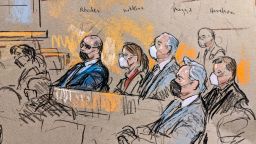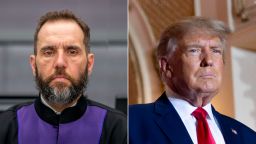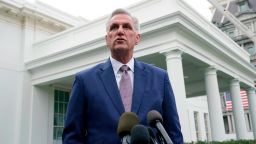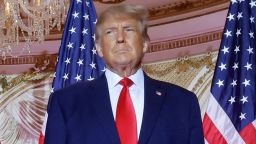begin quote from:
https://www.cnn.com/2022/11/30/politics/kevin-mccarthy-donald-trump-oath-keepers-analysis/index.html
January 6 convictions bolster democracy, but McCarthy’s defense of Trump threatens it
The American tradition of peaceful transfers of presidential power buckled in the horrific violence of January 6, 2021.
Twenty-two months on, a Washington, DC, jury shored up the breaches in the country’s democracy on Tuesday, with a monumental verdict against right-wing insurrectionists.
But while the courts – and voters in the midterm elections – have reaffirmed the rule of law, a furor over ex-President Donald Trump’s meeting with a White supremacist Holocaust denier is underlining just how fragile it remains. As does the refusal of Republican leader Kevin McCarthy – the man who would like to be House speaker – to forthrightly condemn Trump on Tuesday for breaking bread with an extremist.
In a landmark jury verdict, Oath Keepers leader Stewart Rhodes and a subordinate, Kelly Meggs, were found guilty of seditious conspiracy and other charges in what the Justice Department said was a plot to keep Trump in power after his 2020 defeat.
The convictions for a rarely prosecuted offense delivered justice over a constitutional outrage, laid down a deterrent to future coup instigators and showed the legal system can enforce accountability for assaults on democracy.
And they reinforced the narrative that the US Capitol insurrection was not simply a too exuberant protest that spilled over but a pre-planned bid to overthrow the government, the Constitution and the will of voters. The verdicts came as Special Counsel Jack Smith presses ahead with investigations into the ex-president, including over January 6. On that front, Trump’s former close aide Stephen Miller testified to the grand jury on the matter, CNN reported.
Yet a momentous day for democracy represented by the Oath Keepers convictions also brought fresh signs that the forces of authoritarianism, extremism and election denialism are far from vanquished.
McCarthy, who is running to be speaker of the very same House ransacked by Trump’s supporters last year, shielded the ex-president from criticism over his dinner with White nationalist Nick Fuentes a week ago.
The California Republican did say Fuentes had no place in the GOP. But his false claim that Trump had condemned the far-right firebrand four times was consistent with his willingness to appease the ex-president’s incitement in order to bolster power for himself and his party. McCarthy likely needs the support of Trump, and his hard-right supporters in the House, to become speaker next year and if he gets the job, he will remain in their debt.
Fuentes is a Holocaust denier who also has links with pro-Trump House Republicans like Georgia Rep. Marjorie Taylor Greene, who spoke at a White nationalist conference he organized. Extreme lawmakers like her will be even more influential in a narrower House GOP majority. And bringing the events of the day full circle, Fuentes was on the Capitol grounds on January 6, after weeks spouting falsehoods about the election at “Stop the Steal” rallies.
Tuesday’s dramas also unfolded amid fresh signs that although voters rejected many election deniers in the midterm elections, the virus of election denialism is yet to be stamped out. A county in Arizona and one in Pennsylvania have refused to certify their results from this month as misinformation swirls and far-right activists seek to sow distrust in the system based on fraudulent claims.
Despite the US political system holding firm after the 2020 election and being reinforced by the 2022 midterms, when many pro-Trump election deniers lost in swing states, the most fateful divide in American politics remains not between left and right, but between the forces of democracy and those of authoritarianism. Almost every day in Washington can be viewed as a tug between those opposing dynamics, which sometimes cross partisan lines and are boiling to the surface again as the twice-impeached Trump seeks to recapture the presidency.
A validation of the Justice Department
After seven weeks of testimony, Rhodes and Meggs were both convicted of seditious conspiracy and obstructing an official proceeding. Three other defendants were found guilty of a range of other charges related to the insurrection in a vindication of the DOJ’s response to the attack on democracy.
The seditious conspiracy charge is an accusation that an offender conspired to overthrow, put down or destroy by force the government of the US. Specifically, the jury’s verdict is a boost for the notion that the Justice Department can prosecute and obtain convictions on such complex charges and a rebuke of Trump world’s dismissal of the riot at the Capitol. The fact that the jury acquitted some of the defendants of the most serious charges also insulates the prosecution against any claims that it was a partisan trial before a politicized jury.
Stepping back, this court case – one of many ahead targeting alleged perpetrators of the insurrection – represents a tangible attempt to repair American democracy following the trauma of the 2020 election.
“(This) is a great day for the United States, for the rule of law, for the peaceful transfer of power and making sure that that is protected because that was essentially what was on trial,” said Juliette Kayyem, a CNN national security, intelligence and terrorism analyst. “The opposite would have been very bad, I think, not just for the Department of Justice but for incitement and violence – people would have thought that they could have gotten away with it.”
Maryland Democratic Rep. Jamie Raskin, who sits on the House select committee investigating the insurrection – which is expected to unveil its final report next month – said the verdicts would solidify the sense of what really happened in the traumatic weeks after the 2020 election.
“The character of January 6 is now finally sinking in to the whole country,” Raskin told CNN’s Brianna Keilar. “This was a series of events that was designed to overthrow a presidential election and essentially topple the constitutional order.”
The end of the Oath Keepers trial, combined with other convictions of January 6 rioters, reinforced a lingering question: Will there also be accountability higher up the chain – ultimately for those around Trump and the former president himself? He concocted the lie of a stolen election, which has ravaged faith in US democracy, and then told his supporters to “fight like hell” to save their country at the Capitol.
Any convictions in a related case can increase the sense of legal exposure for those also involved in a wider drama. But it remains unclear whether there is sufficient evidence or chances of a conviction to threaten Trump, at least in a legal forum.
But in a sign of the seriousness of Trump’s position, Miller testified to the grand jury Tuesday, making him the first known witness to do so since the appointment of Smith, CNN’s Katelyn Polantz reported. Miller would be in a position to understand Trump’s state of mind before rioters invaded the Capitol. As well as Trump’s role leading up to the insurrection, the special counsel is investigating the ex-president’s hoarding of classified documents at his Mar-a-Lago resort in Florida. Trump has not been charged in either investigation. But both raise the extraordinary possibility that an ex-president – one who is again an active White House candidate – could be indicted. That’s a scenario that would provide the justice system with an even greater test than it faced in the Capitol insurrection, especially since Trump is claiming as a central plank of his campaign that he’s the victim of a partisan persecution.
McCarthy condemns antisemitism while avoiding criticizing Trump
Much of McCarthy’s appearance at the West Wing on Tuesday – after talks on the current lame duck session of the Democratic-controlled Congress with President Joe Biden and other congressional leaders – was squarely within the confines of conventional politics.
He swaggered, consistent with the Republican capture of the House earlier this month, albeit with a smaller-than-expected majority. He was combative, showing his rank-and-file members he was ready to take the White House to task and wield Republican power, setting the tone for a new divided Washington next year. And by stressing core Republican issues like the southern border and backing Twitter chief Elon Musk, he appeared to be shoring up his speakership campaign with soundbites likely to reverberate on conservative TV stations. McCarthy genuinely has a mandate to hold Biden to account – assuming he finally gets the 218 votes he needs to win the speaker’s gavel in January.
Still, his somewhat melodramatic tone might also have been designed to impress Trump if he was watching on television. McCarthy has made a choice to give license to extremism in his conference and on the part of the former president if it paves his path to power.
In his first on-camera response to Trump’s dinner with Fuentes – who was also joined by rapper Kanye West, who has changed his name to Ye – McCarthy said: “I don’t think anybody should be spending any time with Nick Fuentes. He has no place in this Republican Party.”
McCarthy’s comments were a clear repudiation of the Holocaust denier. But he wasn’t finished – and went on to blur the lines about Trump’s behavior and spread misinformation about exactly what the ex-president had said and done.
“I think President Trump came out four times and condemned him, and didn’t know who he was,” McCarthy said. The Republican leader’s statement was at best inaccurate, if not deliberately misleading. Trump has made at least four statements about his meeting with Fuentes, but mostly to claim that he didn’t know anything about him or his views before he showed up at Mar-a-Lago. Given that Fuentes was a vocal supporter of the ex-president, that’s a tough statement to believe.
“I had no idea what his views were, and they weren’t expressed at the table in our very quick dinner, or it wouldn’t have been accepted,” Trump said in an interview with Fox Digital on Tuesday. But again, he didn’t condemn Fuentes or his views, sending familiar veiled signals to far-right groups in his electoral base.
On the one hand, McCarthy’s dancing on the head of a pin was a troubling sign in someone who could soon be the third-highest ranked official in the country. But his defense of Trump and the controversy it will stir up in the media could rebound to his political benefit, since there’s nothing hardline Republicans like more than seeing their leader waging a fight with establishment Washington.
And his unwillingness to unequivocally condemn the former president for meeting the Holocaust denier shows that the strain of extremism that Trump stirs to cement his political power remains a powerful force in the GOP.






No comments:
Post a Comment